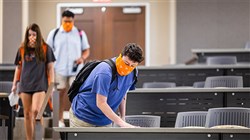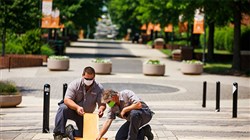VOL. 44 | NO. 30 | Friday, July 24, 2020
Returning UT students face semester of unknowns
By Kylie Hubbard
Excited. Overjoyed. Eager. Undergrads at the University of Tennessee are giddy about returning to Knoxville. Or are they?
The campus shut down in mid-March as a precaution against the COVID-19 pandemic, but now classes are expected to begin Aug. 19 as originally scheduled, even as the virus surges.
“I was definitely excited to return to campus in the fall, but with that excitement I was also concerned,” says Alexandra DeMarco, a junior journalism student. “I, of course, want to go back to school, but I worry about how well that would go without a vaccine.”
Those aren’t the only concerns among students who admit they are anxious about returning to campus only to be sent home again and disrupting their studies or postponing graduation, about feeling safe among so many individuals who may or may not take the proper precautions and about the university’s ability to contain an outbreak.
“I feel that no matter how strict UT’s quarantine policies are, UT is still a campus of thousands of people in close proximity,” DeMarco says. “I think it would be extremely difficult to regulate an outbreak and control the student population if an outbreak does occur.”
Classes are scheduled to begin Wednesday, Aug. 19. Classes will be held on Labor Day and the two days that had been scheduled as fall break, Oct. 8–9. The last scheduled day of instruction for the semester is Nov. 24. All final exams are scheduled to be taken online Dec. 2-9.
Karmen Jones, Student Government Association president and a senior majoring in English rhetoric and Africana studies, says she went back and forth about returning to campus this fall.
“Going into my senior year, I definitely want to see that normalized experience,” Jones explains. “However, I did get a sense of anxiety about it because I want everybody to walk into that space wanting to protect each other and to protect themselves.”
Jones has spent her summer advocating for keeping the student body safest during this unusual time. She’s been working with administrators on plans for three possible outcomes:
• Continuing coursework online only
• Returning to campus with the possibility of experiencing an outbreak
• Returning back to normal without an outbreak on campus.
For now, the administration has chosen to work with Option 3, which allows for activities to resume on campus but with some limitations. Students, faculty and staff will be required to wear face masks during class, as well as while indoors and outdoors on campus, except when in controlled and private spaces. Masks will be provided by the university.

How well the University of Tennessee deals with the virus this fall will largely be up to students. That worries Karmen Jones, Student Government Association president.
-- Photograph ProvidedOn July 2, a mandate was announced that students returning to UT in the fall are required to get a flu shot and a COVID-19 vaccine when developed.
“Any plans of reopening should recognize that some level of precautions will continue to be necessary for at least 18-24 months,” UT’s COVID-19 Dashboard says, adding a three-phase plan has introduced faculty back to campus ahead of the fall semester.
Jones says the university’s COVID-19 taskforce is prepared to handle other outcomes because the shift to online courses in the spring gave students and facility some understanding of that process.
“We have a foundation set because this is how we will execute that moving forward if we were to have another outbreak happen,” Jones says, reflecting on the outcomes the taskforce has considered.
Schedule stresses
After a shortened spring semester, many students are looking for a fresh start in the fall with a full semester in Knoxville. The change to the academic calendar for the fall does add uncertainty.
“I was excited initially to return to campus due to my preference of in-person classes,” says Calista Boyd, a senior studying in the College of Arts and Sciences.
“I am a little anxious since hearing about the decision to condense the semester and minimizing the breaks because, as a College of Arts and Sciences student, I rely on those breaks to do heavy-duty writing for big paper assignments.”
Sophomore Evan Mays says he didn’t think much of the new schedule, and although it’s not ideal, he’ll take it if it means he can return to campus in the fall.
DeMarco says she agrees, adding it’s the best way to return to classes this fall.
“I know that this is probably the best compromise for us to be able to return to campus at all, and I’m grateful that the university was able to come up with a solution,” DeMarco says. “I really hope that the schedule will allow us to go to school for the entirety of the semester, but time will tell.”
Jones was a part of the decision to change the academic calendar as originally scheduled, and she relied on strategic planning to find the best solution.
“It put me in a hard situation because I honestly had to realize that, unfortunately, not all students will practice social distancing throughout their breaks. Not everyone is going to do that,” Jones acknowledges. “And a lot of students, unfortunately, are having parties in the Fort, you know, and over the summer as if COVID-19 does not exist.”
The Fort is the area located behind the Cumberland Avenue Strip, home to the Fort Sanders Medical Center, and is known for parties that draw large crowds of students.
The great unknown
Differing opinions on the seriousness of the virus has left some students at loose ends.
Senior Lucas McClure studying physics says he’s accepted his December graduation ceremony won’t happen, and adds that it’s OK with him, but he’s more upset for first-generation students who won’t get a ceremony after their hard work.
“I was skeptical (about returning),” McClure says. “I had, and still have, reservations concerning UT’s capacity to prevent and mitigate spread.”

UT staffers install pedestrian walkway arrows to help encourage social distancing.
-- Photograph ProvidedUT had an enrollment of 29,460 in 2019, so it’s no surprise that students have reservations regarding the capacity of the university to respond to a new outbreak.
DeMarco says that March was extremely stressful for students to pick up and move back home while also juggling a shift to online classes even without a confirmed case on campus.
Boyd says she agrees with Jones, adding she’s worried about the behavior of students off-campus and how that creates a serious issue for on-campus activities and classes.
“I don’t think UT is super capable of containing an outbreak on campus,” Boyd says. “I think off-campus residents will not follow strict social distancing guidelines regardless, so the risk can’t really be contained by the university.”
McClure says he’s also worried about UT’s precautions, specifically for those in higher age demographics and with underlying health conditions, which COVID-19 impacts at a higher rate. Health conditions such as lung or heart disease, diabetes or conditions that affect a person’s immune system have been shown to impact the severity of COVID-19.
Another concern is the simply the unknown.
Colleges and universities are navigating scenarios no one predicted or has experienced in the past.
“I’m nervous because I don’t think anyone could be entirely ready for something like that anywhere,” Mays says. “However, I think so far UT has worked extraordinarily under the circumstances and I couldn’t ask for better leadership.”
Proven resilience
Boyd says that even with the uncertainty of an outbreak, she’s hopeful that UT can shift gears if needed.
“I know the public would be bothered,” Boyd says, “but if we did it once before, we can do it again.”
Doing it again means shifting to another virtual learning environment and keeping students from campus living. DeMarco says she’s been pleased with UT’s planning thus far, and hopes the university has a plan in place to quickly shift to online classes as needed.
“I just really hope that all of us undergrads will be able to safely enjoy our college experience,” DeMarco says. “And I hope that UT takes the best precautions to keep students safe.”
For a detailed look at UT’s COVID-19 response, visit utk.edu/coronavirus, or view a UT System overview at tennessee.edu/coronavirus.